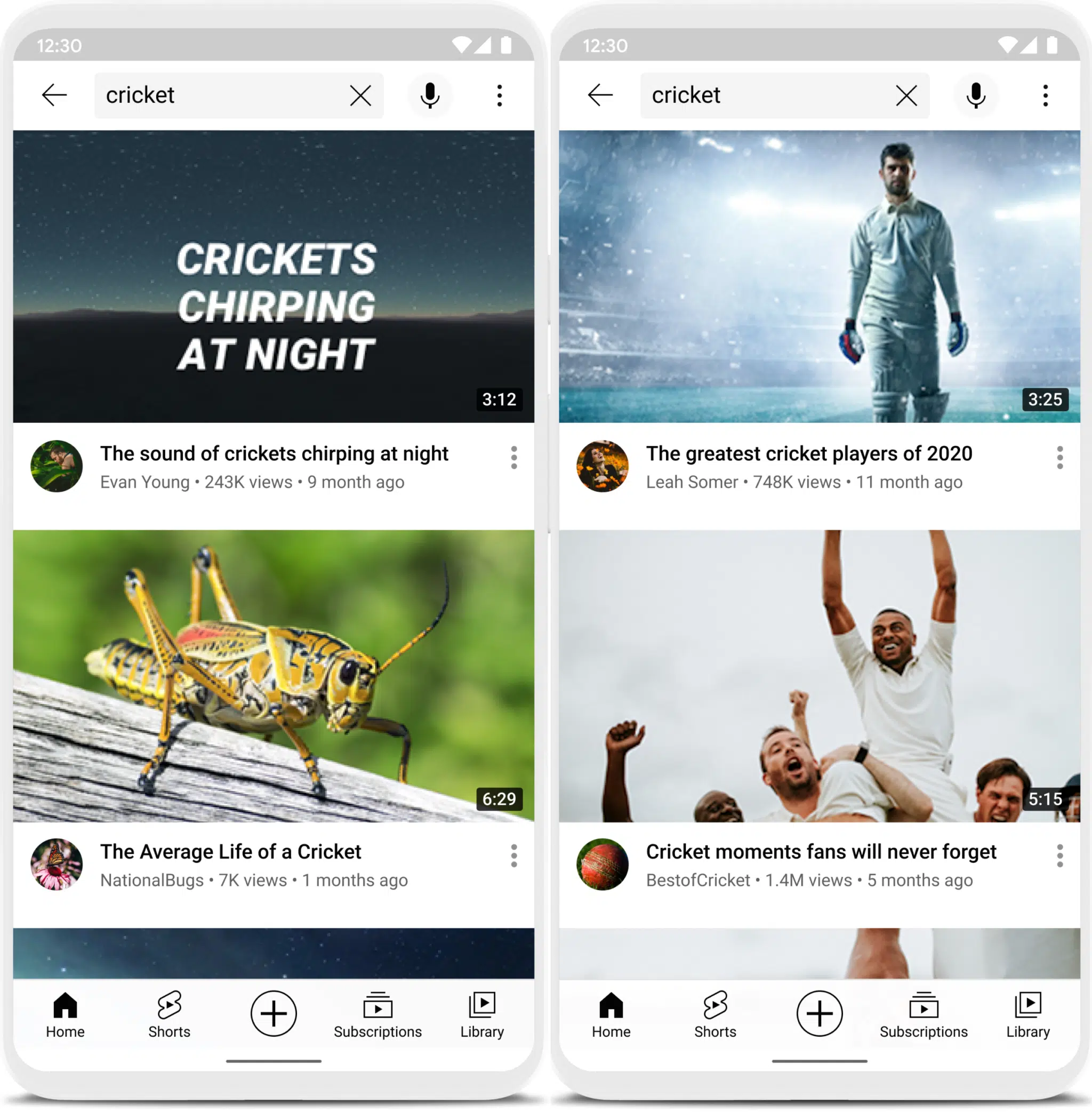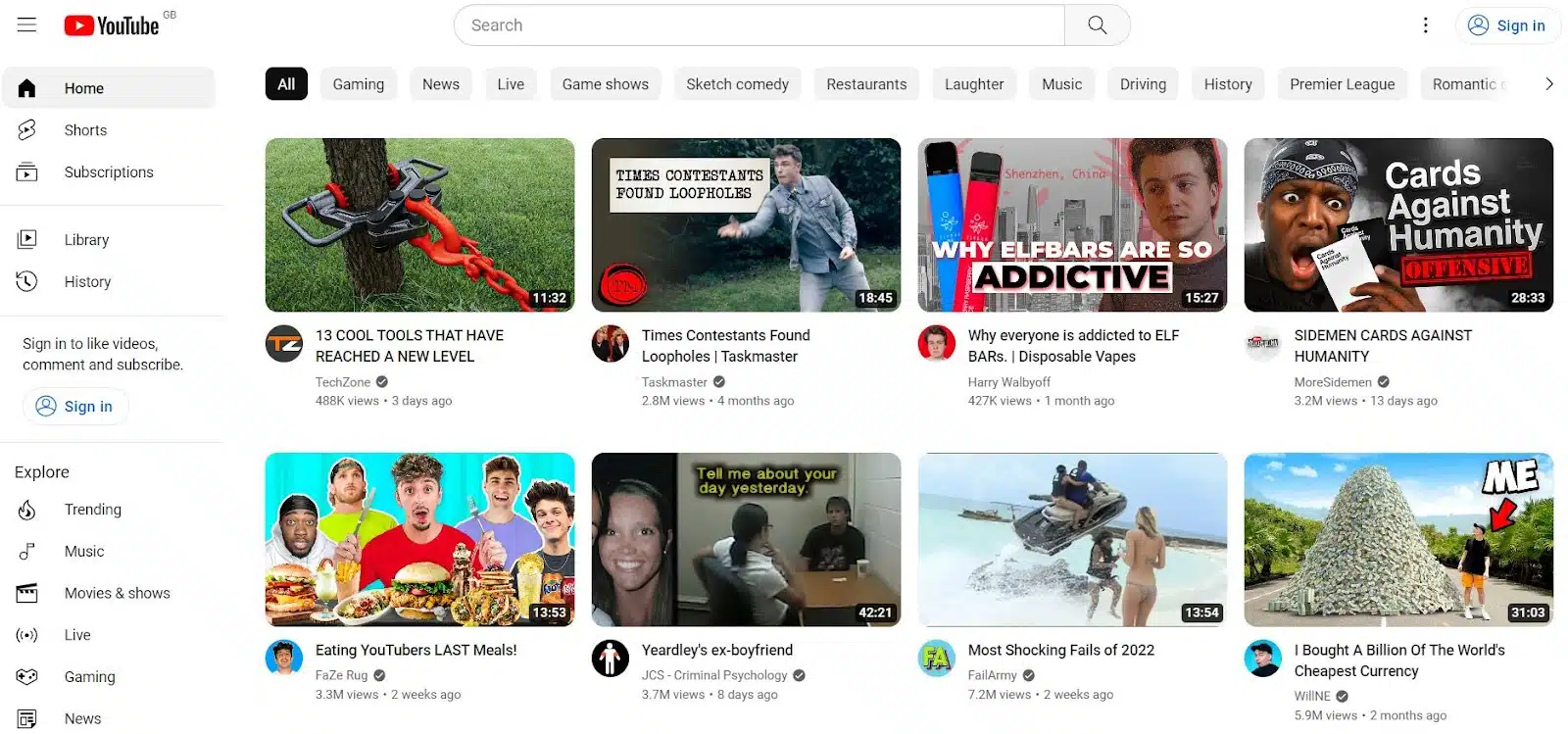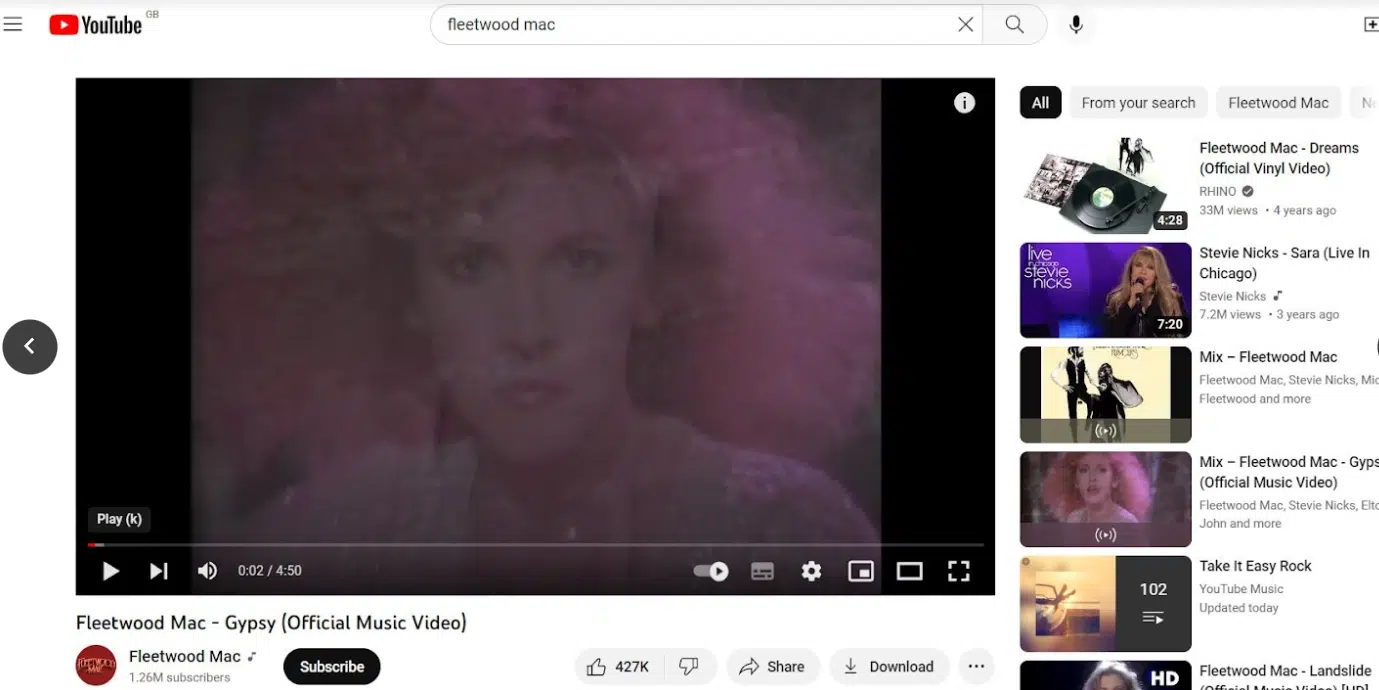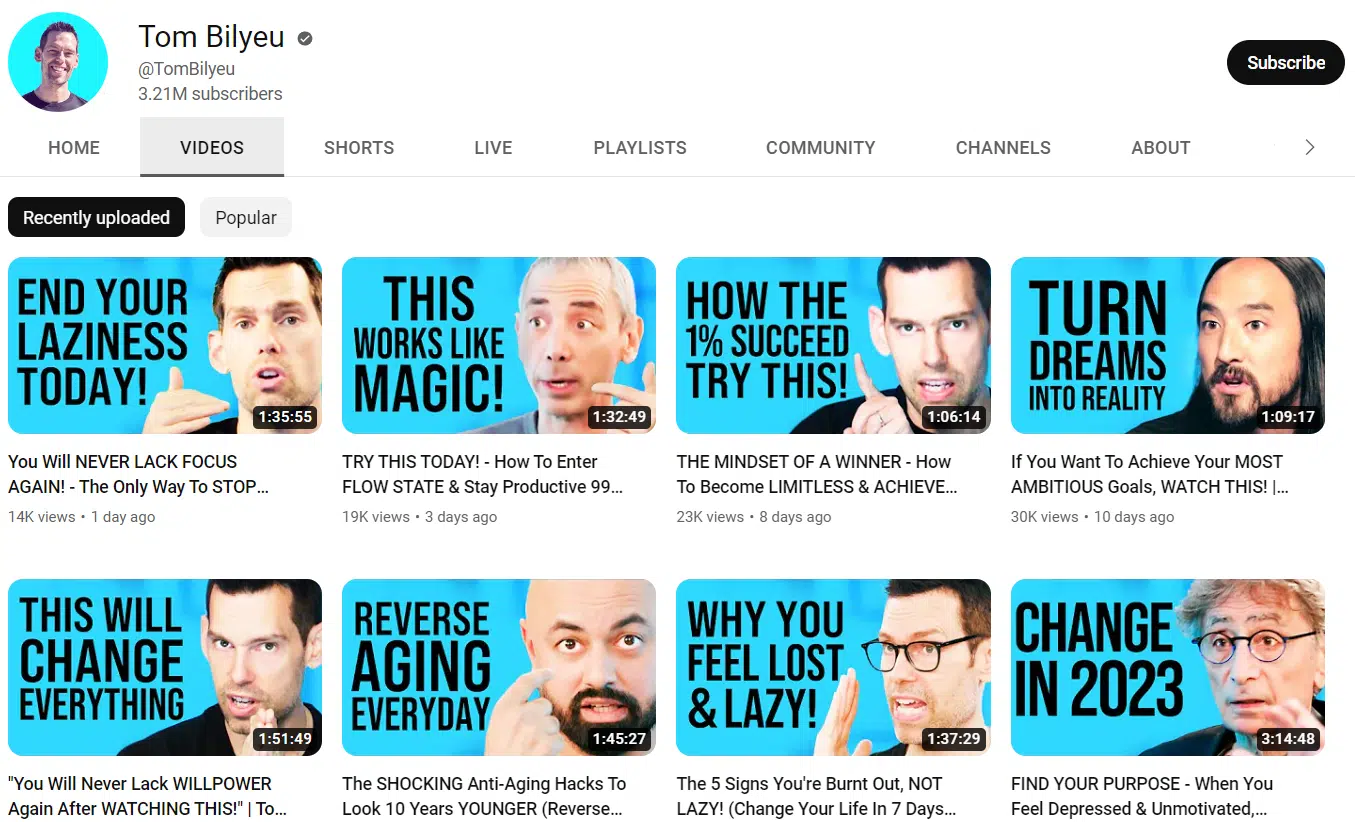YouTube has the second-highest number of active users making it the world’s most popular video-first social media platform. The platform can be credited with keeping viewers engaged since its launch in 2005.
Clearly, YouTube is doing something right with its algorithm, but what is it doing that’s so effective?
We wanted to find out, so we read YouTube’s creator documentation and watched a lot of content to discover how YouTube works. We also asked active creators to share how they find the YouTube algorithm in the real world.
Read on to discover how the algorithm works and what you can do to get the most out of YouTube and gain visibility on your best pieces of content.
What is the YouTube algorithm?
The YouTube algorithm is an AI-powered recommendation system designed to put the best and most engaging content in front of YouTube’s users.
The algorithm is constantly changing to understand the preferences of each and every user. Preferences and engagements inform the algorithm what a user wants to see more or less of.
Understanding YouTube’s algorithm
Naturally, a social media algorithm is designed to provide the most relevant and engaging content to its users. However, an algorithm will always work in favor of a company’s policies, values and mission statements.
YouTube tells us that at the heart of their approach are four Rs, which aim to:
- Remove content that violates policies.
- Reduce false news.
- Raise up authoritative sources for news and information.
- Reward trusted creators.
This tells us that the YouTube algorithm is looking to prioritize content that follows guidelines, is factually correct and comes from authoritative channels and trusted creators.
How does the YouTube algorithm work in 2023?
Like many algorithms, YouTube is using machine learning to understand user behavior. The algo is evolving to prioritize videos users are most likely to watch and interact with.
In their creator videos, YouTube says:
- “YouTube’s recommendation system actually finds videos for viewers, rather than viewers for videos. Videos are pulled for each user when they visit Youtube. The goal of the search and discovery system is to watch each viewer with a video they’re most likely to watch and enjoy. Every viewer’s recommendations will look different.”
This algorithm takes into account several factors when recommending content. The factors can be split into two categories:
- Viewer personalization.
- Video performance.
Viewer personalization includes signals like what videos users watch, which ones they ignore and more.
Video performance is based on viewer satisfaction.
How YouTube measures viewer satisfaction
Viewer satisfaction is determined by factors impacted by users. These factors might include metrics like:
- Longer watch time.
- Video shares.
- Engagement metrics (likes, comments, subscription).
- Watch history.
All of the above are indicators of positive action on a video, which results in video quality increasing.
Let’s break down each part of YouTube and discover how it works.
YouTube search
It’s no secret that people use YouTube as a search engine.
Not only do people use the search bar on YouTube itself, but as a Google-owned channel, YouTube videos can be found on Google search engine results pages (SERPs) and a video tab for video search on Google.
Getting your video featured on a search can earn views from an audience who may not already know you.
YouTube makes its three elements for search very clear:
- Relevance is provided through video title tags, descriptions, and search queries – think keywords.
- Engagement signals such as video watch time help YouTube determine whether or not a video is useful to address specific search intent.
- Quality is the most ominous element with the guidelines stating that YouTube has signals to gauge channel expertise, authority, and trustworthiness.
Impressively, and like any good algorithm, aside from the three elements above, YouTube does consider individual preferences when sharing videos in relation to a search query.
The image below, taken from YouTube, shows this consideration in action.

YouTube creators say:
Dough Dibert from Magnfi shows creators how they can rank a video on Google, in minutes, using keywords.
In the video below Dibert explains that there are five principles to listing a video in Google SERPs and one of those principles is keywords. He explains:
- “You want to have long-tail keywords, the more specific the better…. In the title, in the first sentence of the description…in your tags… You want to name the video file itself the keyword. The next thing… saying the words in the video.”
YouTube homepage
YouTube’s homepage is the place where most users start their YouTube session. It’s the first page users see when they visit the website or open the app.
For users logged in, the YouTube homepage provides video ads, relevant videos, and Shorts that a user might be interested in.
For users who are not logged in, YouTube shares popular videos that one might be interested in. Where YouTube has data on a user (gender, age etc) recommendations will likely be based on this.
The screenshot below shows a YouTube homepage with a user signed out. The videos prioritized on the homepage are newly uploaded.
Clearly, these videos are incredibly popular amongst viewers. In two weeks, one of the videos surpassed 7.2 million views.

It’s clear to see that without viewer personalization YouTube doesn’t really know what type of content to deliver to the viewer, so starts with a range.
Recommended videos
YouTube shares recommended videos on the YouTube homepage and on the “Up next” section.
YouTube is clear that their recommended video algorithm is always changing. To ensure utmost relevancy, YouTube constantly tests and adjusts the recommended videos to individual users.
Where it can, the algorithm takes into account, user:
- Watch history.
- Search history.
- Channel subscriptions.
- Country and time of day for news or trending content.
Another factor in the recommended video algorithm is video quality. YouTube considers whether others clicked the same video or watched it to completion. These signs are important quality indicators for the algorithm.
Finally, YouTube is gathering its own data about how useful a video is through the use of surveys that appear on the homepage and app. This direct feedback is used to refine the algorithm and recommendation system for all users and not just the individual responding.
YouTube creators say:
Zach Mitchem, YouTube Strategist says:
- “Suggested video is the number one thing to focus on and understand. 70% of views on YouTube come from suggested. If you get a video that YouTube likes it will push the video for you.”
Mitchem shares the importance of users watching multiple videos from one channel. If YouTube can see users watching multiple videos from a channel, YouTube will recommend other videos from the channel.
A tactic to help users stay engaged with content is to use a thumbnail template. Mitchem adds:
- “If users like the video, see the thumbnail again later, and click it, YouTube learns users are watching multiple videos. We want to teach YouTube that users don’t watch one video from a channel, they watch ten. When YouTube notices users are watching multiple videos it will see users are staying on the platform, staying more, and watching more ads. YouTube will want to show them more.”
The key here is to use thumbnails to continually engage users and encourage them to watch your other videos.

Trending
Trending is a unique part of the YouTube algorithm because it is not personalized. Trending aims to share videos likely to appeal to a large audience.
Featuring in the trending spot on YouTube will require fast video churn in relation to trending pieces. For the average creator, this might be a viral video capturing viewers’ attention.
YouTube Creators say:
In the video below, Mitchem analyzes the power of trending videos in a commentary on Tom Bilyeu’s channel. He shows how “trend jacking” and thumbnail templates can bolster a channel’s success.
Mitchem points out:
- “Find something in your industry, in your niche that gets a lot of attention. Whether that’s a person, concept or current event… find something with energy and attention on it now. This will help your channel to grow and get more views on your other videos.”
Once you’ve got your video, Mitchem suggests thumbnail templates will improve click-through rate.

YouTube Shorts
With the rise of short-form video, TikToks and Instagram reels you won’t be surprised to hear that YouTube is encouraging creators to use Shorts.
YouTube-backed hashtags like #shorts30 encourage creators to upload one video daily for a month.
Shorts are given pretty high priority on the mobile version of the homepage, featuring after one ad and one long-form video.
YouTube creators say:
Malvika Sheth is an Indian-American digital luxury fashion and beauty creator. Sheth has a following of 120k+ on platforms and is an active YouTube creator.
On Shorts, Sheth says:
- “I’ve been invited to major events on behalf of the YouTube Shorts team, like red carpets for Babylon, Vengeance, and more. Also, looking at my analytics it feels like my new subscribers are coming, and are consuming shorts. It’s hard to say which shorts viewers are crossing to long form, but I feel I’m struggling to convert shorts viewers to long form content.”
It seems that there are two types of users:
- Those who want to watch short-form videos.
- Those who prefer long-form.
Sheth’s experience suggests that creators should be including both long and short-form videos on their channels to give them the best chance of reaching a wider audience.
Sheth also shares that her most engaged Shorts included a viral fashion trend.
Subscribers, subscriptions and notifications
As a creator increasing your subscriber count with an engaged following is highly desirable since subscribers will receive notifications about the channel. Notifications will bring users back to your channel and encourage your most invested viewers to watch another video.
Creators can use subscription data to better understand what their audience likes. Through YouTube analytics, you can see where users subscribed to your channel.
It’s worth remembering here that the YouTube algorithm finds videos for viewers and not viewers for videos. Therefore, if you know a video or short resulted in more subscribers, it might be worth replicating it.
Get the daily newsletter search marketers rely on.
YouTube’s algorithm news, authority and trust
YouTube guidelines make it clear that expertise, experience, authoritativeness and trustworthiness (E-E-A-T) are important factors when it comes to earning favor in the algorithm.
To understand how E-E-A-T works in relation to the YouTube algorithm we read up on how YouTube handles news.
After all, the news is the most important industry when it comes to weeding out false news and providing a space for the most trustworthy content only.
While the news may have slightly stricter guidelines, in all likelihood, the factors can be rolled out to other niches, too.
YouTube establishes E-E-A-T using machine learning. Elements that feed into the algorithm include:
- Authoritativeness: YouTube states that top news stories will be filled with authoritative news sources. YouTube lists CNN and Fox News as two examples. Perhaps the algorithm refers to national publications to determine an authoritative source.
- Expertise: Perceived experts gain exposure in the recommendation system. YouTube uses the example of vaccines where misinformation can spread. For content such as this, YouTube elevates the channels from public health experts.
Tips for working with the YouTube algorithm for more reach
To get the most out of YouTube, you’ll want to create engaging videos for users that its algorithm will view favorably.
This way, YouTube will prioritize your videos on the homepage or in the recommended video sections.
Here are some tactics to get more visibility for your videos.
Keyword research
YouTube makes it clear that keywords, tags, video titles and descriptions help determine video relevancy. Make sure you’re doing keyword research to discover exactly what people are searching for on YouTube. Then, create videos that your audiences are looking for.
Use keywords strategically (and naturally) in video titles and descriptions to increase your chances of appearing for relevant searches. Remember, keyword research will help you on YouTube and in Google SERPs.
Use YouTube Shorts
Experiment with long-form and short-form videos. There’s no doubt that short-form video is on the rise and doesn’t seem to be going anywhere.
YouTube has the functionality to help creators cut long-form content pieces into more digestible Shorts.
YouTube creator, Vanessa Lau, has over 600,000 subscribers on YouTube and claims that 2023 is the year for building an audience.
In her video, Lau shares how YouTube content, particularly Shorts, can be reused on other marketing channels.
Engaging thumbnail
In a world of infinite scrolling and on visual platforms like YouTube (or Instagram) engaging thumbnails are an absolute must.
Instead of using a generated thumbnail for your video, design something that stands out.
YouTube thumbnails that follow a template can help increase engagement on your channel. Help loyal viewers spot your video in a busy space and improve your click-through rate.
Engage with comments
Comments are engagement metrics. Comments on your video increase the chances of YouTube viewing your video as useful and authoritative. Be sure to reply to your comments where you can.
Engaging with comments doubles the comment count and inspires your audience to leave more. If people know they’re likely to get a response, they’re more likely to comment.
Plus, your response could open an engaging dialogue in the comment section. Social media is, after all, here to be social.
Caroline Birks, YouTube Creator at Like Maria, says:
- “Engaging with comments creates a community of learners. In our case, the videos we make are about films or literature and can sometimes generate a lot of debate. The comments allow us to discuss and respond and offer alternative ideas. Engaging with comments helps you get to know your audience better and then tailor your content to them. With poetry, we get a lot of requests from students studying all over the world, to cover poems they’ve been set in class.”
In the video below, you can see the engaged audience at Like Maria sharing differing opinions about the poetry.
The comment section presents an opportunity for Like Maria to engage with audiences and generate more video ideas they know their viewers are interested in.
Market your videos
Videos created on YouTube should serve other marketing channels such as TikTok and Instagram.
Plus, with YouTube’s embed feature adding a video to your site’s blog could not be easier. Embedding a video within your website helps build topical relevancy as the content contextualizes what the video is about.
Videos embedded in blogs are more likely to appear in SERPs and the video search tab.
On marketing videos, Markus Stitz says:
- “A lot of my films on my YouTube channel are part of a bigger PR campaign. Getting videos embedded on external websites works well for driving more external traffic to the video, and in return also boosts views from YouTube browse features and YouTube search. It’s crucial that the media coverage goes live in the first 24 – 48h after the film is published, otherwise, the positive effect on views and likes will be less.”
Stitz’s video, commissioned by Wild About Argyll, earned more than 12,000 views despite the channel having just over 5,000 followers. Marketing your videos can be a powerful way to increase viewership.
Watch time
Your video watch time is a huge indicator that a video is of high quality. If someone stays until the end of the video, they’ve been highly engaged.
This type of engagement will play a bigger role in the YouTube algorithm, so create content that people want to stick around for.
A common tactic can be leaving the best tips until last.
Experiment and have fun
As tempting as it can be to simply please the algorithm and tick a bunch of boxes, don’t.
It’s more important to ensure that your video is exciting for your viewers. An engaged viewer is a sign of a good video so experiment and have fun. If you’re enjoying the video creation process your videos will be better.
Experimentation allows you to understand your audience better so that you can create video after video that they will love and engage with.
If YouTube is finding videos for viewers, create videos your viewers will love.
Opinions expressed in this article are those of the guest author and not necessarily Search Engine Land. Staff authors are listed here.
Related stories
New on Search Engine Land
https://searchengineland.com/how-youtube-algorithm-works-393204


